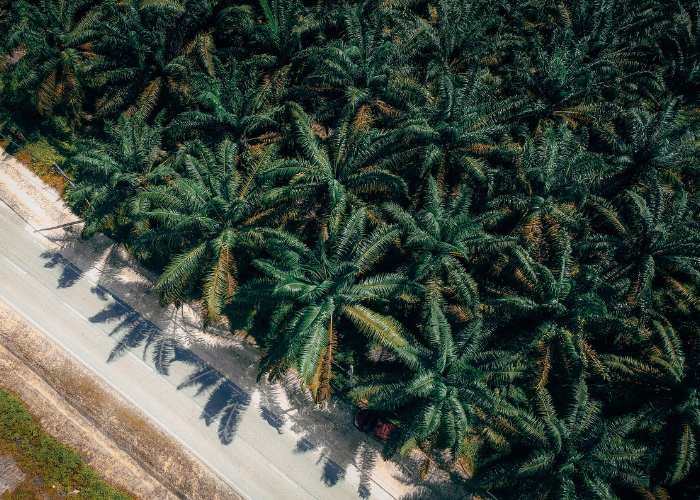Reducing Waste in the Palm Oil Industry: Challenges and SolutionsBY MOHAMAD FADHIL HASAN - INDONESIAN PALM OIL ASSOCIATION
- 5 February 2025
- Posted by: Competere
- Categories: highlights, News, SUSTAINABLE NUTRITION, Sustainable Oils & Fats

The palm oil industry is one of the largest and most influential sectors in global agriculture. However, its rapid growth has led to considerable environmental and social challenges, including deforestation, habitat destruction, and waste generation. Efforts to reduce waste in the palm oil industry have gained attention in recent years as part of broader sustainability initiatives aimed at mitigating environmental impacts and improving the sector’s overall sustainability. This article explores the key types of waste in the palm oil industry and the innovative solutions that are being implemented to address them.
TYPES OF WASTE IN THE PALM OIL INDUSTRY
The palm oil production process involves several stages, each contributing to various forms of waste:
- Palm Oil Mill Effluent (POME): The processing of palm fruits results in a large quantity of wastewater, known as Palm Oil Mill Effluent (POME). POME is rich in organic matter and can pollute water sources if not managed correctly. It is one of the largest waste products of palm oil mills.
- Solid Waste: This includes empty fruit bunches (EFB), palm kernel shells, and fibers, which are byproducts of the milling process. While some of this solid waste is used as biomass for energy production, a significant amount still goes to landfills or is left unused.
- Greenhouse Gas Emissions: Waste in the form of gases, especially methane, is produced when organic waste like POME is left untreated. Methane is a potent greenhouse gas, contributing to climate change.
- Deforestation and Land Degradation: While not a direct form of physical waste, the expansion of palm oil plantations often results in significant deforestation and land degradation, creating long-term environmental waste in the form of loss of biodiversity, soil quality, and water resources.
INNOVATIONS TO REDUCE WASTE IN PALM OIL PRODUCTION
In response to these issues, several practices and technologies are being introduced to reduce waste and improve the sustainability of the palm oil industry.
- Efficient POME Management: The proper treatment of POME is critical to reducing water pollution and minimizing environmental damage. Many palm oil mills have adopted anaerobic digesters, which capture methane gas from POME and convert it into biogas. This biogas can be used to generate electricity, significantly reducing the carbon footprint of the mills. Furthermore, some mills use POME as a source of nutrient-rich liquid fertilizer, recycling the waste back into agricultural systems.
- Utilization of Solid Waste: The use of solid waste like EFB, palm kernel shells, and fibers is becoming increasingly common in palm oil mills. These materials can be converted into valuable byproducts, such as biochar, compost, or used as biomass fuel for energy production. This reduces the amount of waste sent to landfills and creates additional revenue streams for palm oil producers.
- Zero-Waste Processing: Several mills are adopting “zero-waste” principles, where all byproducts are recycled and reused in some capacity. This includes using EFB as mulch or organic matter in the plantation, using palm kernel shells for bioenergy, and converting waste into organic fertilizers.
- Agroforestry and Land Restoration: To mitigate deforestation and soil degradation, some palm oil companies are transitioning to agroforestry systems, integrating palm oil plantations with other crops and trees. This approach helps maintain biodiversity, improves soil health, and reduces the amount of waste generated by monoculture palm oil farming.
- Sustainable Certification Programs: The establishment of many certification programs, such as the Indonesian Sustainable Palm Oil ISPO), the Malaysian Sustainable Palm Oil (MSPO), and the Roundtable on Sustainable Palm Oil (RSPO), have been instrumental in driving more sustainable practices within the industry. These certification schemes require palm oil producers to adhere to strict environmental and social criteria, including waste reduction measures and sustainable land management practices. By promoting these standards, the schemes help ensuring that waste is minimized at every stage of production.
CHALLENGES IN REDUCING WASTE
Despite these promising advancements, there are still challenges in effectively reducing waste in the palm oil industry:
- Cost and Investment: Implementing waste-reduction technologies, such as anaerobic digesters or zero-waste processing systems, requires significant upfront investment. Smaller mills or producers in developing countries may struggle to afford these solutions, limiting the scope of waste management improvements.
- Regulatory Enforcement: While certification schemes provide guidelines for sustainable practices, enforcement remains inconsistent in some countries and/or regions. In the absence of strong government regulations, waste management practices may be less stringent.
- Market Demand for Palm Oil: The global demand for palm oil continues to rise, which puts pressure on producers to expand their plantations. This can sometimes result in unsustainable practices, including waste generation and deforestation, unless strong sustainability standards are adopted at the global level.
CONCLUSION
The palm oil industry is at a crossroads, with significant potential for reducing waste and improving environmental outcomes. Efforts to manage POME, recycle solid waste, and transition to more sustainable farming practices are essential steps toward a more sustainable and waste-reduced industry. While challenges remain, the ongoing development of innovative technologies and the increasing adoption of certification schemes are helping to pave the way for a more sustainable palm oil sector. As consumer awareness and demand for sustainably produced palm oil grow, these efforts will play a crucial role in ensuring that the palm oil industry reduces its environmental footprint and contributes to a more sustainable future.
For more on Indonesian Palm Oil Association, click here >>>
Read Certify, Don’t Replace: The Path to Sustainable Palm Oil>>>
